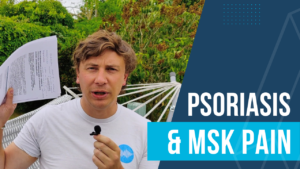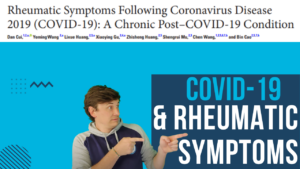Welcome back to the blog! I decided to run a poll on what to publish this week and the results are in! Reactive Arthritis just edged out Sjogrens Syndrome so we will get to that next time. Reactive Arhtritis has gained a little bit of attention recently in Rheumatology circles although I suspect this has passed many of us by so I hope this blog provides some more detail. It is relatively rare, 30-40/10000 but i have seen it a few times in MSK clinics and Orthopaedics over the years.
The recurrent features are back with legend of the blog and music with Evanescence at the bottom of the page.
Please consider heading to the shop to find more resources and supporting me to continue this hairbrained project! Or you can Buy A Coffee
You can also listen to all of my blogs as podcasts subscribe to your preferred channel HERE You can also find my podcast on Apple & Spotify & Google
As usual feedback is greatly appreciated and any further reading for me please send it my way!
PLEASE REMEMBER – THIS BLOG IS NOT A REPLACEMENT FOR CLINICAL REASONING, IF YOU ARE UNSURE GET ADVICE
This weeks Legend Of The Blog is James Noake, he puts great case studies up and we can all learn loads from him in his Sports and Exercise Medicine skillset. Plus, he took a few weeks off twitter and I hope no one missed out too much with his absence! Follow him @DrJN_SportsMed
Within the complexities of inflammatory arthropathies sits Reactive Arthritis (previously known as Reiter’s Syndrome – arthritis, conjunctivitis, urethritis; this combination is rare). This is often a self-limiting disease (the inflammation settles after the infection clears) with almost all patients settling before 1 year. Some will develop chronic arthritis, this is more likely if they had a (relatively) high susceptibility to developing a Rheumatology condition such as having a strong family history or associated inflammatory co-morbidities (crohns, colitis, psoriasis etc.). HLA-B27 is positive in approximately 75% of patients.
Reactive arthritis is a varied condition triggered by an extra-articular infection usually of gastrointestinal (GI) or Genitourinary (GU) origin. Reactive arthritis is often clinically indistinguishable from other arthropathies such as AxSpA or RA. Recognition of the triggering event is key. Occurring in younger Caucasian people aged 20-40, men are much more likely to have the GU origin than women. GI origin has an equal prevalence. Symptom onset is usually within 2-6 weeks of infection.
Associated infections commonly cited are: Influenza, Gastroenteritis and Chlamydia. There is emerging data that Covid-19 is triggering the condition in some people as well.
I have provided a Case Scenario below to aid with your clinical reasoning. For more case studies, download my Clinical Scenarios EBook.
Reactive Arthritis Scenario
Referral
Jennifer is a 30 year old female with severe right buttock, right hip and right heel pain for the last 3 months. She has seen an Osteopath with no improvement. She is asthmatic and has inhalers for this.
Further subjective information
Jennifer had a sudden onset of severe right buttock, right hip and right heel pain 3 months ago. She was previously fit and well, with no prior musculoskeletal issues. She woke up in the night 3 months ago with the severe pain and it has never really improved from this point.
She saw her GP who referred to an osteopath with a possible low back problem that was referring pain into the right buttock and hip. She had 4 treatments but felt she was deteriorating so stopped the sessions. Her GP provided her with Naproxen to see if this would help but after 2 doses she had a severe exacerbation of her asthma. She thinks the Naproxen did help the symptoms.
She struggles to sit for any period of time longer than a few minutes due to the hip and buttock pain. The heel pain is severe after resting and can take a few minutes to ease when walking. All the pains are ok when walking but if she attempts to run, the pain is severe.
She reports clear swelling, heat and redness at the back of her heel.
24 hour pattern
Jennifer wakes most nights around 3am with significant buttock and hip pain. The symptoms are much worse first thing in the morning until she gets moving. Lasting approximately 30 minutes. She feels her right hip and right and ankle are extremely stiff and this eases with gentle movements.
Past Medical History
Jennifer does not report any other medical issues with regards to her heart, thyroid, neurological issues or diabetes. She is asthmatic but does not require her inhalers very often. She denies any history of sexually transmitted infections and has never taken steroids. She does not suffer from anxiety or depression.
Jennifer was unwell with Gastroenteritis approximately 4 weeks before the onset of the symptoms.
Jennifer has no history or family history of inflammatory conditions.
Social Factors
Jennifer is a teacher, she enjoys running 2-3 times per week. She is very careful with her diet and is a strict vegetarian.
Jennifer does not smoke and drinks alcohol at the weekends. Her BMI is 23.
Clinical Reasoning Components
Jennifer warrants further investigation for Reactive Arthritis.
- Severe inflammatory pattern buttock, hip and right heel (insertional achilles enthesitis?)
- Gastroenteritis 4 weeks prior to onset of symptoms
- Reactive arthritis is most common aged 20-40
- Possible improvement with Naproxen
Next Steps
Explain to Jennifer that her symptoms are inflammatory in nature and in her case potentially Reactive Arthritis due to the timeframe of onset this requires investigation under Rheumatology to confirm the diagnosis and generate a treatment plan.
Discuss with Jennifer any strategies that may help manage her symptoms in the short term positioning in sitting and at night, gentle exercises or a graded program to maintain function.
Investigations
Blood tests: (if available and appropriate)
- ESR, CRP, HLA-B27 (I would likely leave this to Rheumatology in this case)
Imaging: (if available and appropriate)
- Difficult to be specific in this case, potentially use for ruling out other clinically important differential diagnoses (I would likely leave this to Rheumatology in this case)
- MRI of SIJs and right hip may be of use
- Ultrasound of the right heel to look for achilles insertion enthesitis
Onwards Referral
Refer to Rheumatology for further investigations, differential diagnosis and commencement of appropriate treatment as necessary.
Conclusion
I hope you have found this useful, keep an eye out in those with a recent infective history. These are relatively rare but FCPs are going to see them for sure!
Music Choice: Evanescence – “Everybody’s Fool”
“Never was and never will be
Have you no shame don’t you see me
You know you’ve got everybody fooled”


